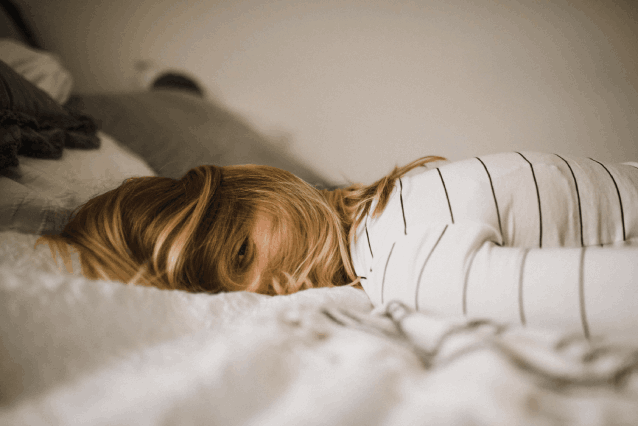Do you get enough sleep? Or is your sleep disrupted several times during the night?
Do you wake up feeling tired, groggy, and irritable?
Chances are you are not getting the sleep you need, and there could be several reasons for this. If we do not get enough sleep, especially deep sleep, this will affect our physical and mental health.
In this article, you will learn:
- What deep sleep is
- What the stages of sleep are
- Why deep sleep is important
- How much deep sleep you need
- How to get more deep sleep
- Tips on how to get the most out of your sleep
What Is Deep Sleep?
Sleep is a natural state of relaxation in living organisms, where voluntary movements decrease and there is a change in the state of consciousness.
Scientists have classified our sleep into repetitive cycles, broken up into four stages. This classification is based on many factors, including brain wave frequencies, breathing, eye movement, muscle movement, and heart rate.
Deep sleep is one of the four stages of sleep, where our entire bodies, and, most importantly, our brains, do most of the recuperating and our cells regenerate.
Deep sleep is vital for improving our overall physical and mental health, and is key to waking up feeling refreshed, energized, and ready to start our day. Not getting the right amount of deep sleep, however, can have serious implications for our wellbeing.
What Are the Stages of Sleep?
There are two basic types of sleep: rapid eye movement (REM) sleep and non-REM sleep. The first three stages of sleep are characterized as non-REM sleep, while the fourth stage is REM sleep. Each is linked to specific brain waves and neuronal activity.
Not all cycles are the same length, and you go through all stages of non-REM and REM sleep several times during a typical night, they also tend to become longer as the night progresses.
Each cycle lasts about 90 minutes on average, and people generally go through four to six cycles in a normal night. However, this can vary depending on the person, their age, and recent sleep patterns.
- First sleep stage: Lasts about one to five minutes. It’s the transition from wakefulness to sleep, where our brain waves, heartbeat, and eye movement begin to slow down, and our muscles gradually relax. Breathing occurs at a regular rate, and the sleeper can be easily awakened.
- Second sleep stage: We move into light sleep, and it can range from about 10 to 60 minutes. Our eyes stop moving, our body temperature drops, and our brain activity, heart rate, and breathing slow down even further. Here, our body is preparing to enter the deepest stage of sleep.
- Third sleep stage: This is when deep sleep, also known as low-wave sleep or delta sleep, occurs. This stage lasts 20 to 40 minutes.
Studies show that brain wave frequencies from an electroencephalogram (EEG)—a test of brain activity—taken from patients in the deep sleep stage are much slower, while amplitude signals (delta waves) are higher.
Most of our deep sleep occurs in the first half of the night, while the second half is more REM-based (fourth stage of sleep).
- Fourth sleep stage: Lasts between 10 to 60 minutes and is mostly associated with the more vivid dreaming parts of our sleep.
Lots of activity occurs during this time. Although we are unconscious and our muscles are atonic (we have no muscle control), our EEG levels are similar to when we are awake. In this stage, our heart rate also increases, and our breathing becomes more irregular.
Each sleep stage plays a crucial part in allowing the body and the brain to recover, grow, and develop.
World-renowned therapist Marisa Peer says, “You can learn how to fall asleep easily by treating the underlying cause beneath your sleep problems, so you can usually get better with simple yet effective techniques you can do yourself at home.” That way, you can turn your sleepless nights into rejuvenating ones and wake up refreshed and full of enthusiasm.
She also says having a good sleeping pattern is essential to being healthy and happy.
How Important Is Deep Sleep?
Scientists are still trying to figure out exactly what deep sleep does and how it functions, but we do know that it is one of the most important stages of sleep because it is critical for restoration.
When we enter delta wave sleep (deep sleep), it allows our brain and body to recharge and restores them to healthy states after the strenuous activity they endure during our waking hours.
Tasks and activities that require mental effort cause increased rates of glucose metabolism in the brain, so it is important to give your brain time to rest from its daily activeness.
Moreover, secretion of growth hormones is linked to deep sleep stages, and the highest rates of production occur at this stage.
Slow-wave sleep also increases parasympathetic neural activity in the brain, which is responsible for relaxation.
In short, deep sleep helps bolster our immune systems, rejuvenate our cells, increase blood flow to our muscles, grow and repair tissues and bones, as well as other essential bodily processes.
Findings also show that deep sleep is vital for consolidating memories, and that the body may struggle to make new memories or even retain information without enough sleep.
How Much Deep Sleep Do You Need?

Research shows we spend about a third of our life sleeping if we get between seven to nine hours of sleep a night.
As we get older, we spend less time in slow-wave sleep and more time in stage two sleep, or light sleep, as we do not need as much deep sleep.
Experts say healthy adults spend around 13 to 23 percent of their sleep in deep sleep—that is roughly between 62 to 110 minutes per night.
There is no preferred minimum time spent on REM sleep, but healthy adults spend 20 to 25 percent of their sleep in this stage and around 75 percent on non-REM sleep.
However, frequent lack of deep sleep and sleep deprivation can cause weight loss or gain, diabetes, stroke, heart disease, and Alzheimer’s disease, and can be dangerous due to impaired reactions and attention lapses.
According to the National Sleep Foundation, “A lack of sleep is linked to overeating—especially the overconsumption of junk food—which can lead to weight gain.
Two hormones that help regulate hunger—ghrelin and leptin—are affected by sleep: Ghrelin stimulates appetite, while leptin decreases it. When the body is sleep-deprived, the level of ghrelin spikes, while the level of leptin falls, leading to an increase in hunger.”
How To Improve Your Deep Sleep
Having helped thousands of people overcome their sleep-related issues throughout her 30 years of experience as a hypnotherapist, Marisa Peer has developed an audio download to help you dramatically improve your sleep. The powerful audio is designed to help you avoid tossing and turning in bed, so you wake up more rested and energized for your day.
Download Perfect Deep Unbroken Sleep and listen to the relaxing, hypnotic script as part of your bedtime routine for 21 days to get the most benefit, and fall asleep easily and effortlessly as you begin to rewire your mind to fall asleep easier.
Deep sleep is vital to our health; it is important to think about the quality of sleep we are getting and whether the time spent sleeping is restorative rather than about the quantity of sleep.
- To increase our amount of deep sleep, we must allow ourselves enough total sleep time every night.
- A healthy diet is also an important factor. Studies have shown that low-carbohydrate and healthy fats diets helps promote deep sleep.
- Avoid caffeine, alcohol, and nicotine. Marisa says, “Drinking caffeinated drinks and eating heavy meals before bedtime can affect sleep. Drinking alcohol also negatively impacts sleep as it reduces REM, which is essential for brain activity. The nicotine from tobacco acts as a stimulant and can make it harder to fall asleep.”
- Exercising at the right time can help extend slow-wave sleep, and experts recommend around 30 minutes a day. Try to avoid exercise before bedtime so as not to interfere with your downtime and your sleep.
Doing vigorous exercise—like running or swimming—during the day can increase deep sleep.
- Generating body heat has also been shown to prolong deep sleep—like taking a hot bath or shower, or warming up in a sauna or hot tub. But, sleeping in a hot room or with heavy blankets will make it harder to slumber, and the room should be cool.
- Try mindfulness exercises (where you practice being intensely aware of your feelings), meditation, breathing, or relaxing yoga before bed. There are many deep sleep meditation and nightly relaxation techniques available. Try this great recovery and replenishment guided meditation by Marisa Peer.
- Remove bright lights and disruptive noises from your bedroom. Bear in mind that bad sleeping partners and snorers will distract you from getting the proper sleep you need.
- If you suffer from any sleep disorders, such as insomnia or narcolepsy (a long-term condition that causes people to suddenly fall asleep at inappropriate times), it is best to consult a physician, depending on your case and symptoms.
You can read more about the symptoms and effects of insomnia in this useful blog post: The Symptoms of Insomnia.
Alternative ways to help improve your sleep
Hypnotherapist Marisa Peer says various therapies can also help you fall asleep, such as her award-winning and highly effective method of hypnosis, Rapid Transformational Therapyp® (RTT®).
The UK’s National Health Service (NHS) also recommends “a regular bedtime routine to help you wind down and prepare for bed. Your routine depends on what works for you, but the most important thing is working out a routine and sticking to it.”
Keep regular sleeping hours as this programs the brain and internal body clock to get used to a set routine.
Keep a sleep diary

It can be a good idea to keep a sleep diary. It may uncover lifestyle habits or daily activities that contribute to your sleeplessness. A sleep diary can also reveal underlying conditions.
Final Thoughts
Sleep and its stages can differ and depend on our age, home environment, work, and social lifestyles. Try out different tips and see which one best suits you.
Marisa says it takes at least 21 days to completely let go of an old belief and create a new one. You need to train your body and mind to release old habits and replace them with new, positive behaviors.
That is why if you can find a bedtime routine, it is usually the best and more stable option to ensure that you wake up feeling refreshed, re-energized, and alert every day.
She says we have to remember that our minds are wired to keep us alive. So, enough sleep is not only key to our overall wellbeing, but also those around us as well!



